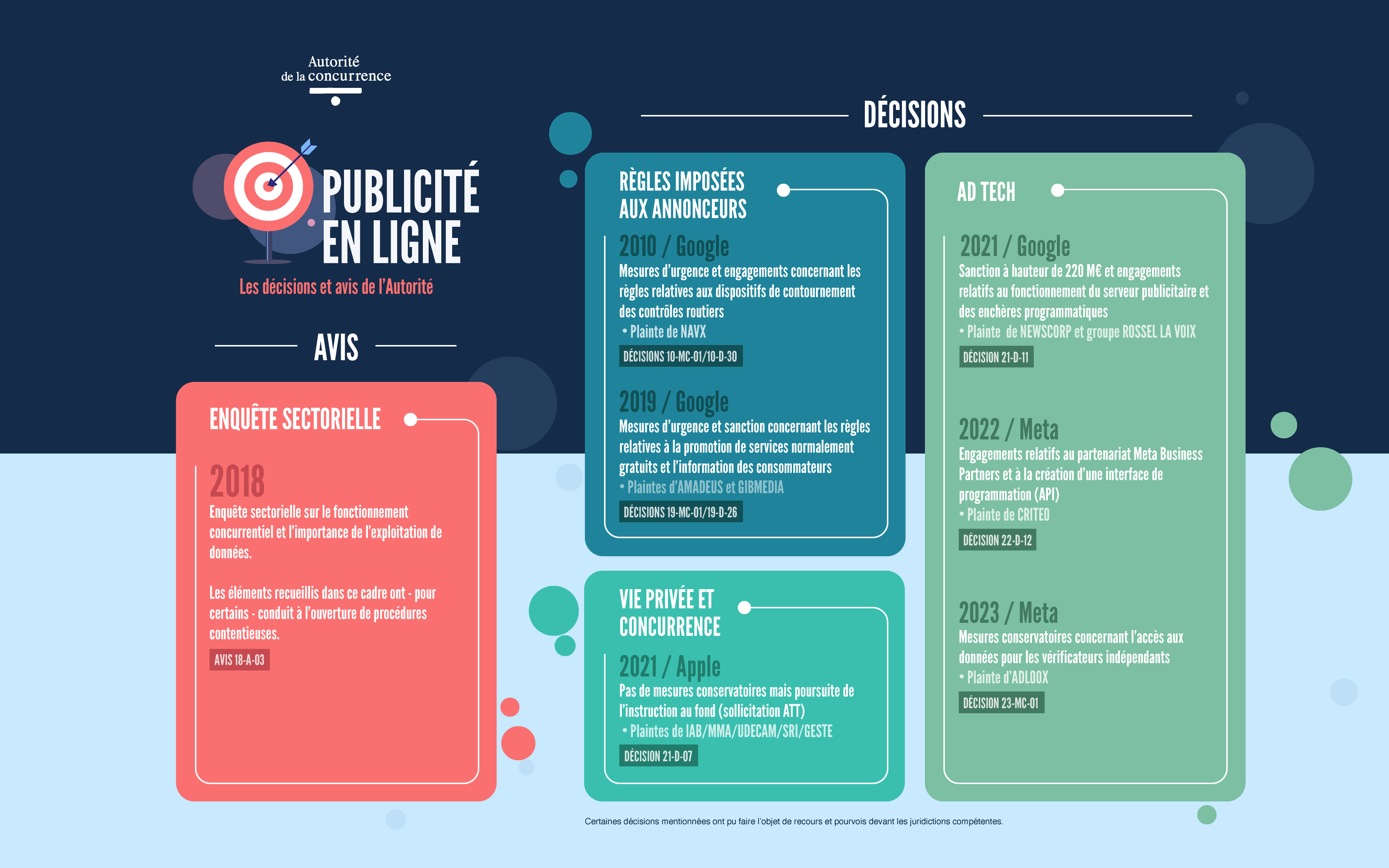Online ad verification: The Autorité de la concurrence issues interim measures against Meta

Background
Having received a complaint in October 2022 from the company Adloox SAS (hereinafter "Adloox") regarding practices implemented by the companies Meta Platforms Inc., Meta Platforms Ireland Ltd. and Facebook France (hereinafter "Meta") in the online ad verification sector, the Autorité de la concurrence (hereinafter "the Autorité") has today issued interim measures against Meta, pending a decision on the merits of the case. The Autorité considered that the conditions for accessing Meta's "viewability" and "brand safety" partnerships were likely to constitute an abuse of a dominant position and cause serious and immediate harm both to Adloox's interests and to the independent ad verification sector.
Consequently, the Autorité has ordered Meta to define and make public new criteria for accessing and maintaining "viewability" and "brand safety" partnerships which are objective, transparent, non-discriminatory and proportionate. It has also issued an injunction to allow Adloox to be rapidly admitted to these partnerships, provided that the company meets the new access criteria.
The ad verification sector
Ad verification refers to the processes in the online advertising sector which are intended to verify the quality of an ad inventory or an ad impression. It pursues three main objectives to ensure the quality of online advertising:
- viewability, which consists in checking that an ad has actually been seen by an Internet user;
- fraud detection, including invalid traffic from machines or robots;
- brand safety, which is intended to verify that the ad is not displayed in an environment which could harm the interests and values of the brand, and brand suitability, which is intended to verify that the ad is displayed in an environment which, according to the advertiser's own criteria, best matches the brand and its values.
This type of services can be offered by integrated advertising platforms for their own ad inventories as well as by specialised independent operators who generally offer more accurate and granular measurements. In order to cover the inventories of integrated platforms, the independent verifiers need access to their ecosystems.
Companies concerned
Adloox is a French company that provides ad verification services on the Internet, specifically to advertisers and media agencies.
Meta (formerly Facebook) is a multinational technology company specialising in Internet-related services and products, which it provides to Internet users, advertisers and developers. In the context of its advertising platform business, Meta also offers ad verification information and features on its own inventory (Facebook, Instagram, Messenger) and Meta Audience Network.
Meta has created two partnerships relating to independent third-party ad verification services: one for viewability (in 2015), and a second for brand safety and brand suitability (in 2019). In the context of these partnerships, for which access is by invitation only, Meta collects, processes and provides data to its partners so that they can offer their verification services on its inventories (in particular on Facebook and Instagram). Three viewability partners (DoubleVerify, Integral Ad Science and Oracle MOAT) and three brand safety partners (DoubleVerify, Integral Ad Science and Zefr) offer ad verification services on Meta's advertising inventories. Since 2021, these partnerships are part of the Meta Business Partners programme.
Practices contested by Adloox
Adloox claims that Meta discriminatorily denied it access to its viewability and brand safety partnerships, even though it was in a similar situation to other companies that had access to these partnerships. Furthermore, Adloox believes that Meta is abusing its dominant position, by imposing unfair access conditions and only granting partial access to its ecosystem.
Adloox's final request, in August 2022, received no response from Meta. In this context, in parallel to its complaint on the merits of the case, Adloox has requested interim measures, intended in particular to order Meta to include it in these partnerships.
The Autorité considers that Meta's practices are likely to constitute an abuse of a dominant position
Moreover, the Autorité considers that Meta has implemented various practices that could constitute an abuse of dominant position:
- firstly, Meta has not defined transparent, objective, non-discriminatory and proportionate criteria for accessing and maintaining viewability and brand safety partnerships, and admitted its current partners to the partnerships following an opaque procedure which only it could initiate. Meta's approach is therefore inconsistent with its specific responsibility as the dominant operator and regulator of the independent ad verification market on a platform that accounts for a substantial portion of advertisers' ad spend.
Although, in the context of the investigation, Meta provided the Autorité with new "eligibility criteria" for these partnerships in January 2023, these were not made public and are still intended to be implemented in the context of an invitation system. Moreover, at this stage, these criteria seem both disproportionate and unjustified; - secondly, the refusal to grant Adloox access to the partnerships is likely to be qualified as discriminatory, as Adloox is in a situation comparable to that of certain operators who were able to access these partnerships, with regard to the conditions allegedly applied by Meta. Furthermore, the exchanges between Meta and Adloox reveal that Meta never intended to integrate Adloox, and several exchanges appear to be purely delaying tactics.
Article L. 464-1 of the French Commercial Code (Code de commerce) provides that the Autorité may issue interim measures when it considers that practices cause serious and immediate harm "to the general economy, to the sector concerned, to the interests of consumers or, where applicable, to the complainant company". In this case, the Autorité considered that Meta's practices cause:
- serious and immediate harm to the independent ad verification sector, insofar as they result in the oligopolistic structure of the market becoming more entrenched. Indeed, access to Meta's ecosystem is crucial for independent ad verifiers, given the large-scale investment of advertisers in its inventories, but also the growing demand from their clients for a single offering which covers all online advertising channels. By creating artificial barriers to entry and expansion, such practices significantly hinder the development of the ad verification sector and the incentives to innovate. The extent of these practices is all the more serious as they are implemented in the context of the forthcoming opening up of the independent ad verification market. Indeed, the European legislator has laid down, in the Digital Markets Act (Regulation 2022/1925 of 14 September 2022), the obligation for the main advertising platforms to provide free access to all the data necessary for the independent verification of their ad inventories;
- serious and immediate harm to the interests of Adloox, whose inability to provide its verification services on Meta deprives it of an important growth driver and is likely to result in the loss of its current clients. It should also be noted that Adloox's business has declined significantly since 2017, concomitantly with Meta's refusal to admit it to its ecosystem, while the business of its competitors admitted to the ecosystem has grown significantly. The refusal of access to Adloox could therefore lead, before the end of the investigation into the merits of the case, to its foreclosure from the ad verification market.
Interim measures issued
Given the potentially anticompetitive nature of the reported practices as well as the harm caused to the ad verification sector and to Adloox's interests, the Autorité has ordered Meta, first, to suspend the criteria implemented in January 2023 and, second, to define and make public, via the website of the MBP programme "Measurement" (https://www.facebook.com/fbp/measurement), within two months, new criteria for accessing and maintaining "viewability" and "brand safety" partnerships which are objective, transparent, non-discriminatory and proportionate. Meta will have to implement the criteria in the context of a transparent access procedure which is not based on invitation.
The Autorité has also issued interim measures to accelerate the process of admitting Adloox into these partnerships in the event that its application for access, examined on the basis of the new criteria to be adopted by Meta, is accepted.
These interim measures will remain in effect until the Autorité issues its decision on the merits of the case. During this period, and in order to ensure the effectiveness of these interim measures, Meta will have to send the Autorité regular reports on the implementation of the injunctions issued.

Presentation document (PDF)
Decision 23-MC-01 of 4 May 2023
Contact(s)
